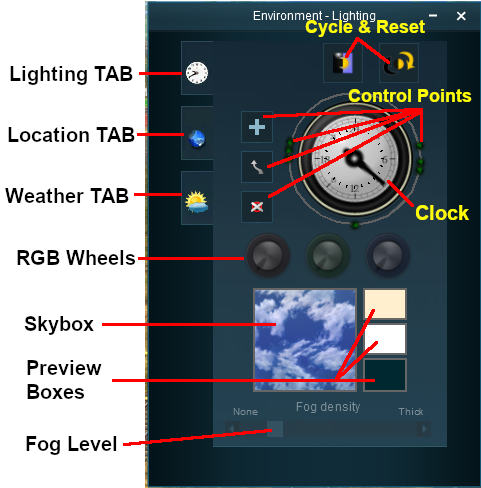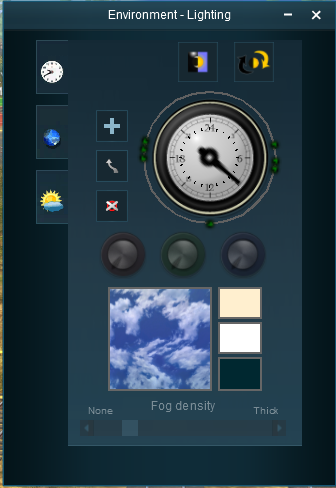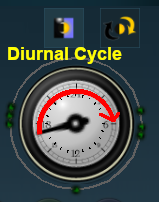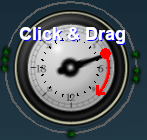How to Use Environment Tools
(→Setting the Light Conditions) |
(→Setting the Light Conditions) |
||
| Line 229: | Line 229: | ||
Setting the right colours can be more of an art than a science. To get the exact colour you want means mixing the correct quantities of '''Red''', '''Green''' and '''Blue'''. Each of these colours has 256 different values from 0 to 255 and, when combined, that produces over 16 million different possible colours - but many monitors and most eyeballs will not be able to tell the differences between many of those colours.<br> | Setting the right colours can be more of an art than a science. To get the exact colour you want means mixing the correct quantities of '''Red''', '''Green''' and '''Blue'''. Each of these colours has 256 different values from 0 to 255 and, when combined, that produces over 16 million different possible colours - but many monitors and most eyeballs will not be able to tell the differences between many of those colours.<br> | ||
| − | <table cellpadding="4" bgcolor=#ffffb0> | + | <table cellpadding="4" bgcolor=#ffffb0 width="750"> |
<tr valign="top"> | <tr valign="top"> | ||
| − | <td>[[file:PencilTips.PNG]]</td> | + | <td width="25">[[file:PencilTips.PNG]]</td> |
| − | <td | + | <td>Setting all three colours to the same values will produce monotones from '''Black''' to '''White''' with 254 different shades of gray between those two tones. Note that in the examples below, the "tyre" around each wheel shows the exact ''quantity'' of colour that is being added.</td> |
</tr> | </tr> | ||
| + | </table> | ||
| + | <table cellpadding="4" bgcolor=#ffffb0 width="750"> | ||
<tr valign="top"> | <tr valign="top"> | ||
| − | <td>'''R = 0; G = 0; B = 0'''</td> | + | <td width="250" align="center">'''R = 0; G = 0; B = 0'''</td> |
| − | <td>'''R = 128; G = 128; B = 128'''</td> | + | <td width="250" align="center">'''R = 128; G = 128; B = 128'''</td> |
| − | <td>'''R = | + | <td width="250" align="center">'''R = 255; G = 255; B = 255'''</td> |
</tr> | </tr> | ||
<tr valign="top"> | <tr valign="top"> | ||
| Line 245: | Line 247: | ||
</tr> | </tr> | ||
<tr valign="top"> | <tr valign="top"> | ||
| − | <td>'''Black'''</td> | + | <td align="center">'''Black'''</td> |
| − | <td>'''50% Gray'''</td> | + | <td align="center">'''50% Gray'''</td> |
| − | <td>'''White'''</td> | + | <td align="center">'''White'''</td> |
| + | </tr> | ||
| + | <tr> | ||
| + | <td colspan="3" align="center"> | ||
| + | All other colours are made by mixing ''different'' quantities of the three colours.</td> | ||
</tr> | </tr> | ||
</table> | </table> | ||
Revision as of 20:02, 19 July 2018
Contents |
| Notes: The Environment Tools are used to set:-
|
|
| The Time of Day is set using Session rules such as |
| The World Origin and Date settings are used to set the current season e.g. January = Summer in the Southern Hemisphere and Winter in the Northern Hemisphere |
The Environment Tool
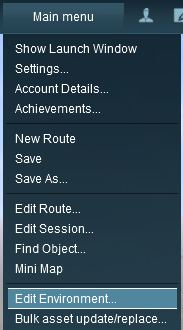 |
Open the Environment Tools Editor from the Surveyor Main Menu as shown on the left. This will open the Environment Properties Window as shown below.
|
Lighting
The Lighting Tools control the ambient and sun colours. This tool tab is opened by default whenever the Environmental Editor is opened.
Light and Time
Setting the Light Conditions
The ring around the dial contains a number of green dots. Each dot is a reference point or a control point. It sets the specific Red Green and Blue colour values for the light at that particular time.
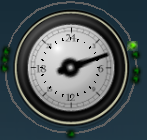 |
|
||||||
| Each colour value can be altered by dragging its needle point to a new position around the dial. Each new position will change the balance between the 3 colours and will alter the lighting displayed in the scene at that particular time. |
| Notes: Each reference point stores the RGB values for three different types of lighting in the scene.
|
The 3 boxes below the colour wheels and next to the Sky box show the colour effects created for each type of lighting at the selected time.
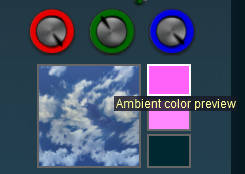 |
|
||||||
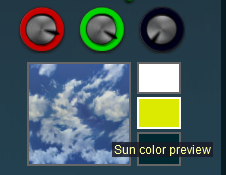 |
|
||||||
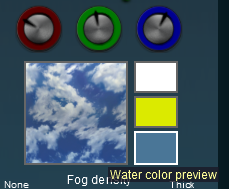 |
|
||||||
Setting the right colours can be more of an art than a science. To get the exact colour you want means mixing the correct quantities of Red, Green and Blue. Each of these colours has 256 different values from 0 to 255 and, when combined, that produces over 16 million different possible colours - but many monitors and most eyeballs will not be able to tell the differences between many of those colours.
| Setting all three colours to the same values will produce monotones from Black to White with 254 different shades of gray between those two tones. Note that in the examples below, the "tyre" around each wheel shows the exact quantity of colour that is being added. |
| R = 0; G = 0; B = 0 | R = 128; G = 128; B = 128 | R = 255; G = 255; B = 255 |
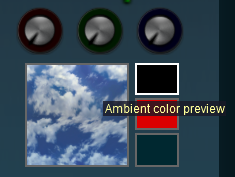 |
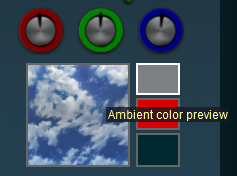 |
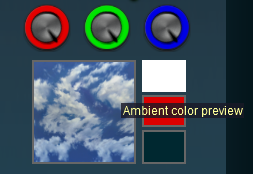 |
| Black | 50% Gray | White |
| All other colours are made by mixing different quantities of the three colours. | ||
